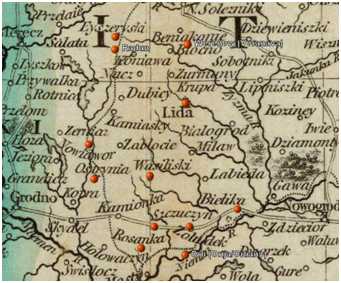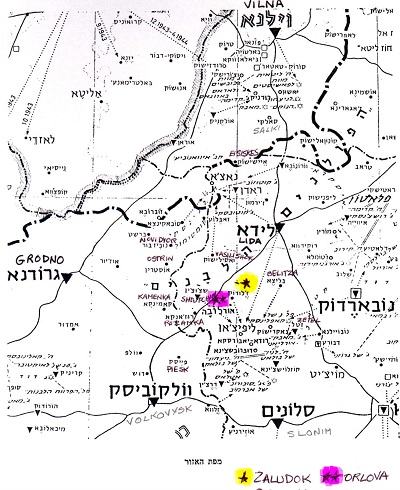 |
|
| Contents | |
| Lida Uezd Homepage | |
| Lida Uezd History | |
| Lida Uezd Towns | |
| Lida Uezd Maps |
|
| Searchable
Databases |
|
| Lida Uezd
during the Holocaust |
|
| JewishGen
Home Page |
|
| KehilaLinks
Home Page |
|
|
|
BELITSA
with dependent villages of Bucile,
Baczepicze, Mociewicze, Nahorodowicze, Nieciecz, Krasna, Poniemunce,
Tobola and estates and hamlets of Czertok,
Jelna, Jeremiewicze, Klukowicze-Pustki, Puszcza, Sidorowce, Stoki,
Turowa Gora, Wreczyszno, Zblany and
***Badary, Czaplewszczyzna,
*Zarzeczany, **Liniany, Czaplewszczyzna, In the fifteenth
century, Grand Duke owned Belitsa during which time (1431-1500) a
Catholic church was built. In 1486 documents dating , Belitsa was
designated as a mestechko [small town]. At the end
of the fifteenth and the beginning of sixteenth centuries, Belitsa was
center of the pavet [like a county or German kreis].Wwners of Belitsa
included Y. Ilinich and Y. Radzivil. Grand Duke of the Great Lithuanian
Principality and King of Poland Zhigimont II August presented Belitsa
to M. Radzivil Rudoi. In 1553, Radzivil established the Calvinist
Church there. In 1627, the mestechko had a fair, six streets, and
seventeen houses. In the second half of the seventeenth century,
Calvinist synods took place there. In 1795 when Vitenshtein and
Trubetski owned the town, Belitsa reverted to the Russian Empire
withinLida povet. In 1886, Belitsa was the volostj center with one
hundred houses and 883 residents, a school, an Orthodox church, a
Catholic church, and a synagogue. Four annual fairs took place. The rabbi in 1912
was Yosef ben Meshulam Feish Rudnik (1875-?). During World War I,
Germans occupied the town. In 1921, Belitsa belonged to Lida powiat,
Wilno voevodstvo of Poland. In 1929, Belitsa was the seat of the
community council, gmina wiejska [rural village] and miastezko (town)
of Lida powiat with Justice of the Peace in Lida and Justice Court in
Wilno, Nowogrodskie woj. The 1921 population was 506. In 1928, Bielica
was designated as a miastechzko (small city) and gmina wiejska (parish
town), seat of community office, in the Second [?] Uchastok, Lida
powiat, Nowogrodskie voevodstvo of Poland. The Justice of the Peace was
in Lida and the Justice Court in Wilno. 1928 population was 506 with
one Catholic church, one Orthodox church, one synagogue, and mills.
Markets were Wednesdays. The railroad was nine km away in Niemen. The
post office and telephone were in Bielica (Belitsa) with the telegraph
in Lida. Markets were Wednesdays. In 1939, Belitsa was part of the
Belorussian Soviet Socialist Republic. In 1941, Germans occupied
Belitsa and liberated by Red Army troops in 1944. In 1970, 913 people
lived 285 buildings and had a bakery, cinema, school, post office,
hospital, and a Monument to the War Heroes. As of 1991, Belitsa was a
village in Lida district situated on the river Neman and center of a
collective farm named after Yuri Gagarin, thirty km from Lida and six
km from the Neman railway station and on the Slonim Lida Road. The 1991
population was 852 with 356 buildings. Bucile: country- circle {district} in commune Bielica in administrative district (powiat) Lida - includes the villages: Bucile, Bielowce, Piaskowce, Krasoczki, Maciewicze and the settlement Czechowsczczyzna. [translation from by Jan Sekta] Mociewicze/Makhovichi/Mocevicy
at 5349 2510: In 1928, Mociewicze was designated as
a wies (village) of Bielica in the Second Uchastok, Lida powiat,
Nowogrodskie pow., Poland. The Justice of the Peace was in Lida and the
Justice Court in Wilno. The 1928 population was 512. The railway
station was eighteen kilometers away in Skrzybowce. The post office,
telephone, and telegraph were in Zaludok. Bielica.
1.) mko w 1-ym okr. administr. pow. Lidzkiego, na prawym brzegu Niemna.
przy ujsciu Molczadki i Niemenka, od Wilna 116 wiorst, od Lidy 28 w.
Mieszka?cow ob. p?ci 877. Niegdy? starostwo z zamkiem bardzo dawnym.
Zygmunt August darowa? B. Miko?ajowi Radziwi??owi Rudemu, kt?ry w. r.
1553 koscio? parafialny kalwinom odda?. Synody kalwi?skie w XVII w.
Cerkiew prawos?. Przeprawa przez Niemen, stacya obserwacyjna i port. Po
Radziwi? ?ach dziedziczy B. obecnie ks. Piotr Wittenstein. Balinski
(Staro?. Polska, t. III, str. 263) myli si?, pisz?c, ?e tu
by? koscio? dominikownow, fund. Sapiehy: by? i jest koscio? (dzi?
podominika?ski) w Jelnej, 0 3 w. od Bielicy, przy go?ci?cu do Lidy. W
B. jest tylko kaplica parafi Jelna. Gmina wiejska B. pow. lidzkiego ma
5489 ludn., t.j. 2624 me?. 2865 kob. W?oscianie mka B. maj? 2962 dz.
gruntu. Gmina B. liczy 674 dym., i sklada si? z 6 okr?gow wiejskich a
28 wsi. Okr?gi te sa: 1) Bielica, 2) Baczepicze, 3) Krasna, 4)
Poniemunce, 5) Bucile, 6) Tobola. Okr?g wiejski B. liczy w swoim
obr?bie: mko B.; wsie: ***Badary, Czaplewszczyzna, *Zarzeczany,
**Liniany. Bielica. 1.) Small town in first
administrative district of Lida, on right bank [shore] of the Nieman
near the confluence of Molczadka and Niemenek Rivers, 116 wiorsts from
Wilna, 28 wiorsts from Lida.Inhabitants of both sexes 877. At one time
regional administration (starosty), with a very old castle. Zygmunt
August presented Bielica to Mikolajowi Radziwil Rudy who returned the
parish church to the Calvinists in 1553. Calvinist synods took place
here in the seventeenth century. Formerly, there were here also an
Orthodox Church, a ford across the Niemen, observation station and
port. After Radziwil, Bielica was inherited by the present [1888] Count
Piotr Wittenstein. Balinsky (Staroz. Polska, volume III, page 263)
erred, writing that there was a Dominican church here, founded by
Prince Sapieha: this church is actually in Jelna, 3 wiorsts from
Bielica, on the road to Lida. In Bielica there is only a chapel of
Jelna parish. Rural commune Bielica, powiat (administrative district)
Lida has 5,489 population, i. e. 2,624 males, 2,865 females.
Inhabitants of the small town Podsol have 2,962 dz. [measurement of
area=2400 sq. saz., 1.9508 new Polish morgs, 109.252 ars.] under
cultivation. Rural administrative district Bielica counts 674
homesteads, and consists of 6 rural districts and 28 villages.
Districts are: 1) Bielica, 2 ) Baczepicze, 3) Krasna, 4) Poniemunce, 5)
Bucile, 6) Tobola. Rural district Bielica has these precincts: small
city Bielica: villages Badary, Czaplewszczyzna, Zarzeczany, Liniany .
[Translation by Jan Sekta for Ellen Sadove
Renck].
If
you have Lida uezd
materials to share, please considering donating it.
If you read Yiddish or Hebrew, please contact us.
Records are
held both in Grodno and Vilna archives.For Lida records translation,
your tax deductible contribution by credit card via the secure server
at either group or by mail will grow our knowledge. For a $100
donation, you receive all these records translated two years ahead of
their posting on JewishGen. Every penny collected is used for Lida uezd
projects only. Records include censuses; family lists; marriages,
births, death records; prenumeraten lists; and more. Please contact Judy Baston
with any questions.For current translations, please see the ALD:
All Lithuanian Database and Belarus
SIG Database.
|

